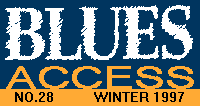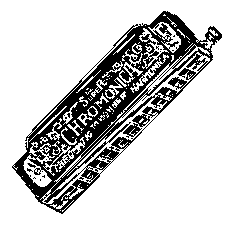

 | ||
| The Doctor is In! |

Inquiring minds want to know. Some even bother to ask questions. Rare indeed is the soul who writes them down. Rarer still the mild-mannered but piquantly flavored harp-care provider who reflects upon the question and any other shiny surface, as the light glints off his well-worn pate. What secrets lie within that intellectual pi-ata, that yard sale of intellectual discontinued items? Damned if I know, but once you start it, things are gonna run their course. The envelope, please.
Dear Harpo,
I am having major grief with harps going out of tune, often in just a matter of minutes. I play mainly Hohner harps, normally Marine Band, but find these are way out of whack after a decent session. Having spoken to an "expert" on the subject, I tried a couple of Meisterclasse harps, as they apparently have stronger reeds. Still no real success -- they played OK for a couple of gigs and then dropped completely out. I don't play particularly hard, nor do I bend an awful lot. Am I missing something here, or am I doomed to a life of shelling out copious amounts of cash every time I play?
Robbo
Like sand through the clockworks of time, like soup through a fork, like it or not, here we come. Trouble is, where is Robbo from?
Dear Robbo,
There are a number of reasons why you might singlehandedly be responsible for putting Hohner in the black if you continue harmonicacide at this alarming and expensive rate. I don't doubt your veracity, but you asked, so I'll review all of the possible explanations, and you try them all until you have a fit (or not have a fit, which you are evidently already doing).
1) Your choice of harps. Forget anything under $15. Nothing below that level is up to regular playing. They also have a tone like a Whoopie Cushion. I don't agree with your expert on Meisterclasse having stronger reeds; they're just a better-made harp with an alloy body that requires more parts and labor, and therefore more money. Not necessary for you.
I get years of use out of standard Marine Bands, and not so much good playing out of any of the other models, either because of less crispness of tone, or, in the case of the Blues Harp, because the thinner and theoretically more bendable reeds crap out early in their careers.
For someone like yourself, who blows out Marine Bands just to watch 'em die, consider the Hohners built on the 14-hole 364 frame -- not the bass harmonicas, but the new ones with the four extra notes on the low end, combined with a standard 10-hole diatonic setup. They are stiff as starched boxer shorts right out of the box, so maybe they will hold up better for you.
2. Your technique. You may be blowing too damned hard and distorting the metal in the reeds with too strong an air stream. I know you said that you don't play particularly hard, but if your reeds could talk, would they sound cranky? Especially if you are playing amplified, you may be blowing your reeds to metal heaven trying to be heard over a guitarist who figures that the rest of you guys are just there so the stage doesn't look too empty with just him. And your instrument feeds back a lot quicker than theirs. A little feedback is OK for lead players but horrible for harpists. You either need to play with more considerate players (often known as professionals) or get a stack of Twins, mike 'em up and start learning to read lips.
3. You're using the tongue-blocking technique rather than the pursed-lip approach. When you go to sound a single note, do you pucker up your lips and give a nice, dry, hope-to-get-to-first-base smooch to the appropriate aperture, or do you mash your swampy ole tongue against three or four holes, leaving only one very small escape route for all the air, spit, and unidentified flying objects that may have wandered into your mouth?
If that's not disgusting enough, do you ever play when you have a cold? All of that goop lodges in your harps and doesn't drain out, leaving a gummy, gluey residue that forms little gray snowdrifts in the holes. If that crud breaks loose, it'll either lodge in a reed or a lung, depending on which way the wind is blowing at the time. There's a reason they put a drain on brass instruments to tap that sludge off. Try changing techniques and tap your harps out after playing.
4. Faulty harp maintenance. If you secrete any of the above disgusting viscous substances into your harp, the least that you could do is to chisel out the above-referenced nasty accumulations from the holes in the intake manifold of your instruments. It's not that hard, and all you need is a small screwdriver (go to an auto parts store and ask for a screwdriver for ignition work) and a little vodka.
Chip that junk out with the flat blade, tilting the harp down so you don't get shrapnel in the reeds once you free it up, and tap the crap out often. DO NOT blow into it to clear little crummy crumbs, you'll waste a harp in one blow, a record even for you. Use a lint-free cloth to wipe down the comb with a vodka bath and hit the reed plates, too, to remove any junk on the chrome. Don't neglect to run the blade edge along the seam where the reed plate meets the comb. There's many a surprise hidden there, too.
And when you're done, you may want to take a slug or two on the vodka just to settle your stomach.
5. What's that in your mouth, Alfie? It should be obvious that you don't eat a can of Pringles and then immediately blow into a 50-dollar harp unless you're doing research for Hohner. However, any food remnants, even from meals gone by, may be ready to leave the comfort of your dental work for the promised land in your reed plate. Brush your teeth or at least rinse your mouth out (soap optional) after eating anything. Remember, too, that any beverage not called water has a residue that works like Bondo on reeds, and I don't have to repeat that whole disgusting discussion above, do I?
If this doesn't help, I suggest you quit your day job and go to work for Macy's, inflating the balloons for the parade. There ain't a harp that can handle you. Good luck!
Your mind-numbing missives to the maharishi of the myxolidic mode may be mailed to:
 |
 |